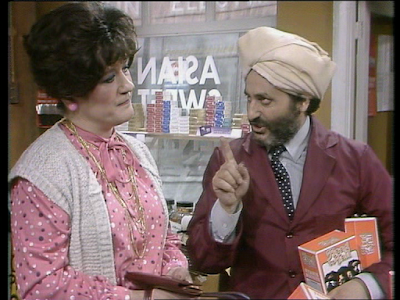On his sixtieth birthday, henpecked husband
Henry receives a £13,000 insurance payout and inherits a house in
another part of the country so leaves home to start a new life.
The second of three Peter Tilbury sitcoms for Thames (this one written in collaboration with David Firth), this was not quite so fondly remembered or satisfactory as the early series of Shelley or It Takes A Worried Man. It shares some aspects of the Tilbury style: a lead character who speaks in an externalised internal monologue, a sense of life being full of absurd petty irritations and rules, and clever sequencing where each scene seems to start a bit later than you'd expect. Also, it has an unusual concentrated structure as a series, with a serial narrative depicting events in 48 hours.
This first episode displays both promise and some potential problems. Aside from Henry, the supporting characters look to be rather trying stereotypes of the period; a militant shop steward who finds objection to everything; Nadim Sawalha as an ingratiating turbaned corner shop owner who misunderstands English expressions; and - worst of all - a cockney punk rocker young person, costumed in mohair jumper, black leather jacket and green hair. None of these strike me as characters that would make me want to tune in again next week to see more of. Curiously, we get a much better idea of Henry's wife as a distinctive character in her own right, even though we never actually see her apart from as a arm, waving dismissively from behind a door.
Against this, you do get Robin Bailey as Henry, playing exactly the type of role to which he was particularly suited.. "I have to admit that I really prefer comedy," he once said, "because it's where I can most easily share the attitude of the writer. Irony is my normal state of mind." Henry's qualities of fluency and detachment couldn't be better achieved, and much of the comedy of the character stems from Bailey's natural authority failing to be recognised or realised.
The second of three Peter Tilbury sitcoms for Thames (this one written in collaboration with David Firth), this was not quite so fondly remembered or satisfactory as the early series of Shelley or It Takes A Worried Man. It shares some aspects of the Tilbury style: a lead character who speaks in an externalised internal monologue, a sense of life being full of absurd petty irritations and rules, and clever sequencing where each scene seems to start a bit later than you'd expect. Also, it has an unusual concentrated structure as a series, with a serial narrative depicting events in 48 hours.
This first episode displays both promise and some potential problems. Aside from Henry, the supporting characters look to be rather trying stereotypes of the period; a militant shop steward who finds objection to everything; Nadim Sawalha as an ingratiating turbaned corner shop owner who misunderstands English expressions; and - worst of all - a cockney punk rocker young person, costumed in mohair jumper, black leather jacket and green hair. None of these strike me as characters that would make me want to tune in again next week to see more of. Curiously, we get a much better idea of Henry's wife as a distinctive character in her own right, even though we never actually see her apart from as a arm, waving dismissively from behind a door.
Against this, you do get Robin Bailey as Henry, playing exactly the type of role to which he was particularly suited.. "I have to admit that I really prefer comedy," he once said, "because it's where I can most easily share the attitude of the writer. Irony is my normal state of mind." Henry's qualities of fluency and detachment couldn't be better achieved, and much of the comedy of the character stems from Bailey's natural authority failing to be recognised or realised.

No comments:
Post a Comment